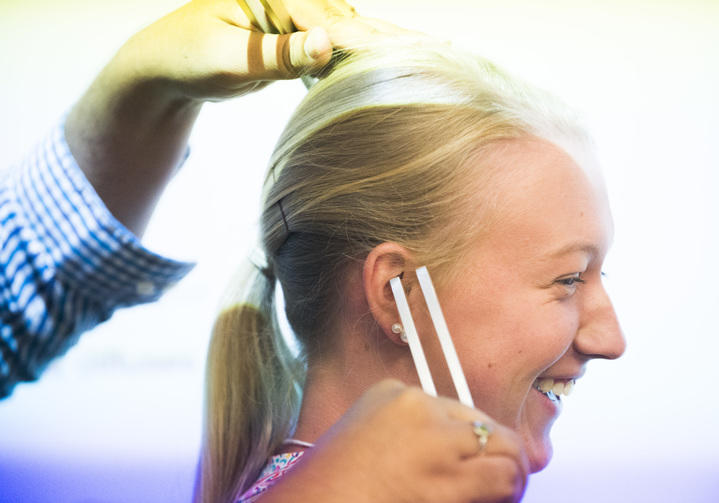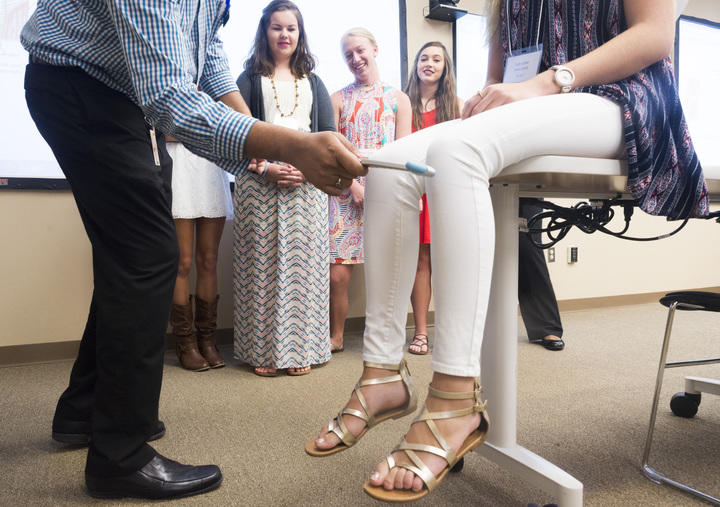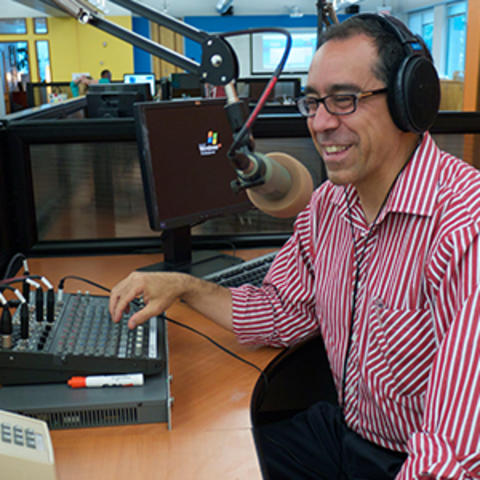Section Branding
Header Content
A Farm Team For Rural Doctors
Primary Content
Dr. Jean Sumner, dean of Mercer University's School of Medicine, stood at the front of a classroom addressing two dozen high school students.
"Welcome to med school,” Sumner said, as the young people giggled. This is a project started by Sumner and her team at the medical school. And it's all about trying to identify and attract applicants from rural Georgia.
"We're really trying to look for ways to build up our applicant pool from those areas because those are the kids we want," Sumner said. "We need to develop a farm team."
“Farm team” takes added meaning when you consider the audience of teenagers comes from 4-H Clubs in southeast Georgia. The project is a first for Mercer and the state 4-H organization – giving rural kids a taste of what it’s like to be in medical school. The 4-Hers took turns simulating doctor-patient conversations and learning how to test a reflex.
Rural Georgia has a doctor problem. A recent study by the Georgia Budget and Policy Institute finds two-thirds of the state’s counties don’t have enough doctors and most of those counties are rural.
So the Mercer-4-H effort is trying to excite young people like McKinely Cranford about the possibility of health care as a career.
After Cranford tested a knee reflex, she explained her hope to serve her hometown of Cochran as a pediatrician.
"Just helping people that I've always known," she said. "People ... that come back to Cochran. I want to help them."
Laura Harker, a health care policy analyst for the Georgia Budget and Policy Institute, appreciated the Mercer-4-H recruitment effort. But Harker said that there are large forces at work in rural areas that make attracting new doctors difficult.
"It's really important to focus on the current issues with rural hospitals and clinics that they're facing, with having to care for so many people living in poverty or who are uninsured and not able to pay for care," she said.
That situation can lead to rural hospitals struggling to balance their budgets. And those shaky hospital financial conditions can make small towns unattractive to prospective doctors.
Mercer medical school officials understand this dynamic. So they are seeking young people with a proclivity to live in a rural setting.
"That is the beauty of this program," said Frank Carter, who is on the Georgia 4-H Foundation's board of directors and also is a practicing doctor in Waynesboro, population 5,800. "Where we hope it sticks is that you get rural youth that understand small towns, and like small towns, and would live in a small town."
Nick Morrow is a current Mercer medical student who says that when he graduates, he plans on practicing in northwest Georgia, near Cartersville.
Morrow is just the kind of medical school applicant Mercer hopes to find with the 4-H initiative. He took time out from his studies to talk with the 4-Hers about being a medical student because he believes in the idea of giving young rural kids an idea about what's possible.
"There's plenty of children in these small towns just like me that have the aptitude to do these things," he said. "It’s just sometimes they don't end up doing that with their life because they don't have they don't have a clear path in front of them. Their dads and moms aren’t doctors and lawyers, you know, they come from a rural background."
Mercer has also put some money behind the rural recruitment effort. The medical school has set aside a $35 million state grant for scholarships to any medical student -- 4-H or not -- willing to work in a rural setting.
"We will be able to train young physicians and they will come out essentially debt free," Sumner said.
Sumner said that Mercer plans a series of these recruitment effort linked to 4-H clubs, including holding one on Mercer's Savannah campus for young people living in that area of the state.
Support for health, education and poverty reporting on GPB Macon comes from the Peyton Anderson Foundation.



